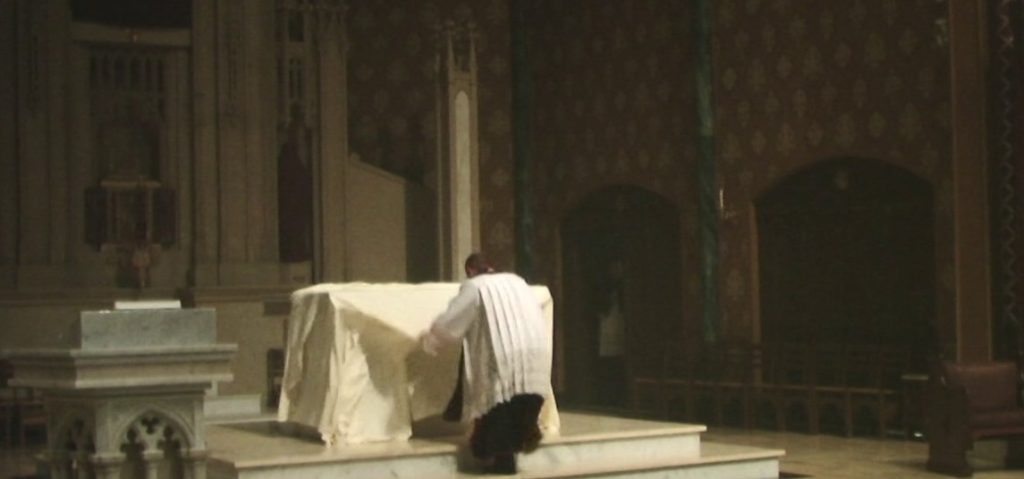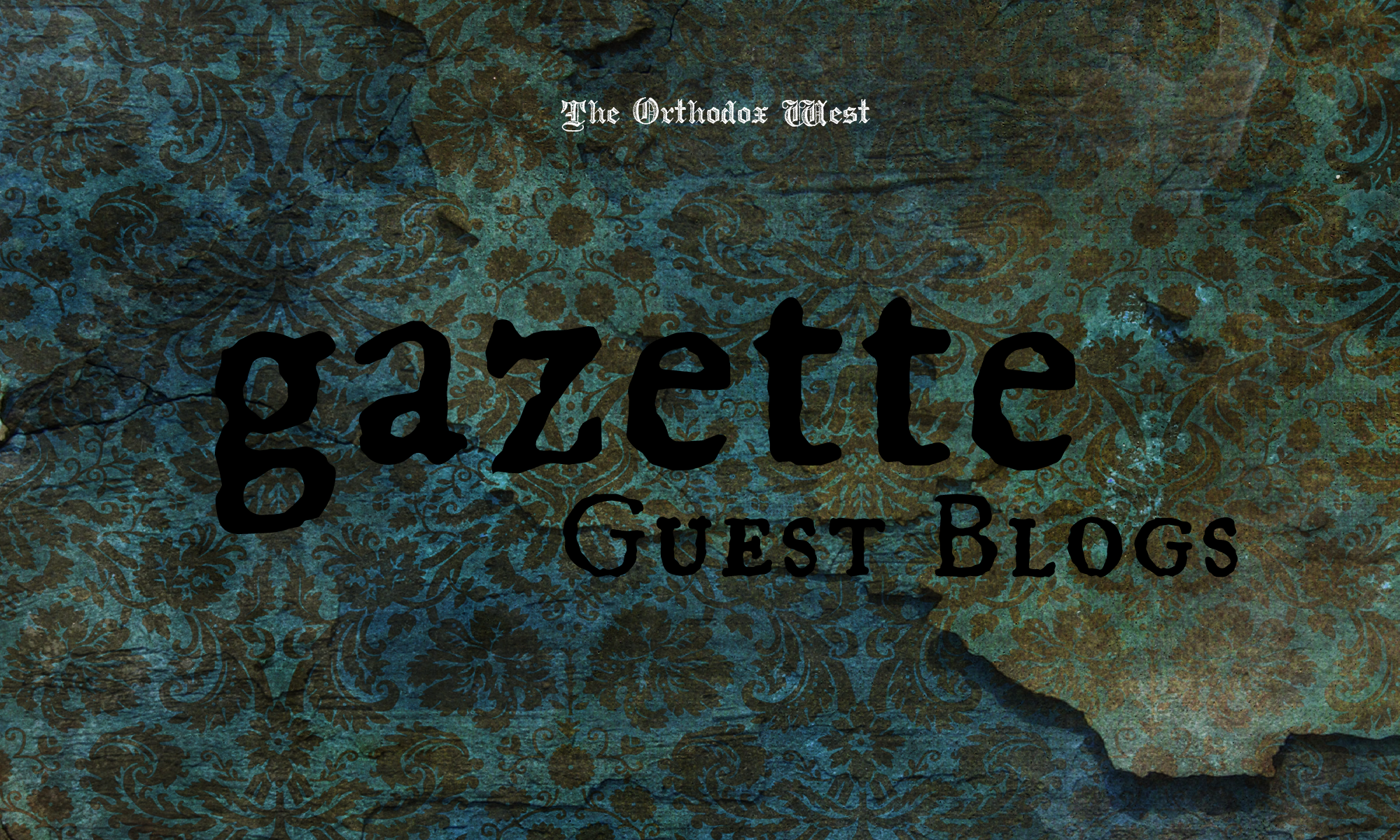
By Mark Meador
The eve of the Sacred Triduum (Maundy Thursday, Good Friday, and Holy Saturday) brings us to one of my favorite times in the liturgical year. Certainly the Masses for these three days are extremely moving and powerful in their own rights, but I am particularly captured by the changes in the Divine Office over the same period.
If you’re familiar with the Western Rite, you likely recall that after Mass on Maundy Thursday the altar is stripped: the ciborium is removed to the altar of repose, and the altarcloths, flowers, and any relics are taken away. All is left bare, save for a single white cloth during the Presanctified Mass of Good Friday. Here we are given a visual, physical representation of Christ’s own hiddenness after His betrayal and death, and a sign of the suspension of the newly instituted sacrament of the Last Supper that will only return with Christ from the tomb.
If you keep a Benedictine prayer rule, you know that something similar happens to the Divine Office.
As with the Mass and sanctuary, this begins on Ash Wednesday. While in the liturgy we “bury” the Alleluia, so in the Divine Office “Alleluia” is replaced with “Praise be to thee, O Lord, King of eternal glory.” In addition, multiple parts of the office are said kneeling: the Preces, “Lord have mercy upon us,” the Our Father preceding the Collect, and the Collect(s).
Things accelerate in Passiontide. Just as the icons, statues, and crucifixes are veiled in the church, so, too, the Office increasingly veils its glory at this time. We kneel once more during the final two stanzas of the hymn at Vespers, the Glory be is removed from the Short Responsories at Vespers and Lauds, and the Suffrage of all Saints is suspended. This continues through Wednesday in Holy Week.
After Vespers on Holy Wednesday, the office is even further stripped. Maundy Thursday begins with Matins on Wednesday evening, to which is added Lauds in a service called Tenebrae–Latin for “darkness.” Just as the candles of the Tenebrae candelabra are extinguished one by one following each psalm, so the Divine Office at this time finds itself gradually darkened.
First, we see that Matins begins with the Our Father, Hail Mary, and Creed said secretly, but then skips “O God make speed…,” Psalms 3 and 6 and the Invitatory, and the Hymn, and instead commences immediately with the psalms. The Glory be following the psalms is also stricken, as are the absolutions and “But thou, O Lord…” that precede the lessons of each Nocturn. At the conclusion of the third Nocturn, the Hymn, Gospel, and Collect are omitted and Lauds begins at once.
Lauds likewise abandons the opening prayers and Psalm 67, and begins immediately with the first antiphon and psalm. As is typical, we start with Psalm 51, followed by two more psalms and a canticle. However, in place of Psalms 148-150–from which Lauds derives its very name–is said only Psalm 147. The Chapter, Short Responsory, and Hymn are then skipped, and we proceed to the Versicle and Benedictus. Lauds and Tenebrae then conclude with a single antiphon, the Our Father said in secret, Psalm 51, and a single Collect.
In the morning, the little hours of the Divine Office are also abbreviated. Prime, Terce, Sext, and None all begin at once with the psalms, after which they conclude as at Lauds. Vespers also begins with the psalms, abandons the Chapter, Short Responsory, Hymn, and Versicle, and concludes after the Magnificat as at Lauds. Compline omits everything from “Sir, ask a blessing…” to the Our Father, and proceeds immediately to the Confession. Again the Versicle prayers (“Turn us then, O God..,” “O God, make speed,” etc.) are skipped and the psalms begin at once. After the psalms at Compline, all is replaced with The Song of Simeon and the conclusion as at Lauds.
This is repeated for the hours of Good Friday and Holy Saturday.
While it is most apparent to one who prays each of these offices daily, the litany of omissions illustrates to even the novice that much of the glory of the Church’s prayer life has been stripped away during these three days.
But what is most moving is how those alterations to the Office actually mirror the trials of Christ, and allow us to walk with Him, as it were, as He carries His Cross.
At the start of Maundy Thursday, the prayers of the Church begin to show forth the agony and exhaustion that Christ will undergo in the Garden of Gethsemane that evening. As Christ mourns already in His heart His approaching death, so too does the Divine Office cast off all adornment and beauty. To Christ’s kneeling in prayer to the Father we have joined our kneeling at a growing portion of the prayers of each Hour through Passiontide.
Christ is stripped of his garments twice: first when he is scourged, and again at his crucifixion. Likewise, the Divine Office is twice stripped of its adornments during Passiontide. First it foregoes the Glory be and Suffrage of All Saints. Then, in the Triduum, the Office is laid bare and almost naked, having lost entire verses and responses, scripture readings, and prayers. In these days it is little more than penitential psalms and concluding prayers, the bare bones of the Office. In this way it speaks to us of the nakedness of Christ as He is tormented through His Passion. As we come nearer to the scourging, crucifixion, and death of the Word made flesh, our prayers dare not even to utter the words that once knit the psalms to the hymns and collects.
As our Lord was given a crown of thorns and robe in mockery of his kingship, so the the Alleluia and Glory be, which crown and robe the antiphons and psalms, are stripped away and even the antiphons are replaced with ones more somber. The first words of Matins at Maundy Thursday set the tone for these three days: “The zeal of thine house hath even eaten me; and the rebukes of them that rebuked thee are fallen upon me.”
These expansive recisions to the Office also speak to us of Christ’s silence before His accusers and breathlessness through his pain and under the weight of the Cross. As Christ held His tongue before Pilate and the High Priests, so the Office commends silence to the faithful by what it no longer says. And as Christ was gasping for breath on the Cross, so we find ourselves grasping for the lost prayers and exchanges that have been torn from our rite of daily prayer.
Finally, we consider how Christ bore his Cross to Calvary, thrice collapsing under its weight and requiring the assistance of Simon of Cyrene. The Office undergoes a similar exhaustion. Stripped of so many prayers, readings, and responses that ordinarily support the psalms, each hour of prayer has, in a sense, collapsed upon itself. It is Lauds that comes to the assistance of Matins to support it through the dark of night, as Simon did for Christ on His dark path to Golgotha.
In fact, from the first knee that is bowed on Ash Wednesday, it is as if the Divine Office itself is carrying the Cross of our Lord all through Lent. And now, come to its final steps, it is short of breath and falling to its knees–three times, just like our Lord–as it approaches the foot of the Paschal Vigil.
We have been prepared for this, albeit in a gentler way, throughout the rest of the year. For example, we drop the Suffrage of All Saints and the Preces during the observation of feasts. These prayers, directed to invoking the intercession of the cloud of witnesses on our behalf and making a confession of our sins, give way to the praise of a particular saint or feast, which is really a manifestation of Christ, a “breaking in” of God into the story of man.
In a way, Easter is the Octave of the entire Church year. At the very moment when God makes his greatest intervention in the history of mankind–His own death upon the Cross to destroy death, propitiate our sins, and grant us eternal life–the Divine Office takes its greatest step back, creating tension through its silence to draw our attention to what is at hand.
And then all is revealed. After Christ’s resurrection, the Office not only returns to its full form, it raises the volume. The prayers and responses are all restored, the knee no longer bows, Alleluia is added to antiphons and versicles, and we recite the Commemoration of the Cross.
As we prepare our hearts for the great oblation of our Lord, may we find in the Divine Office a meet companion for the way of the Cross.
